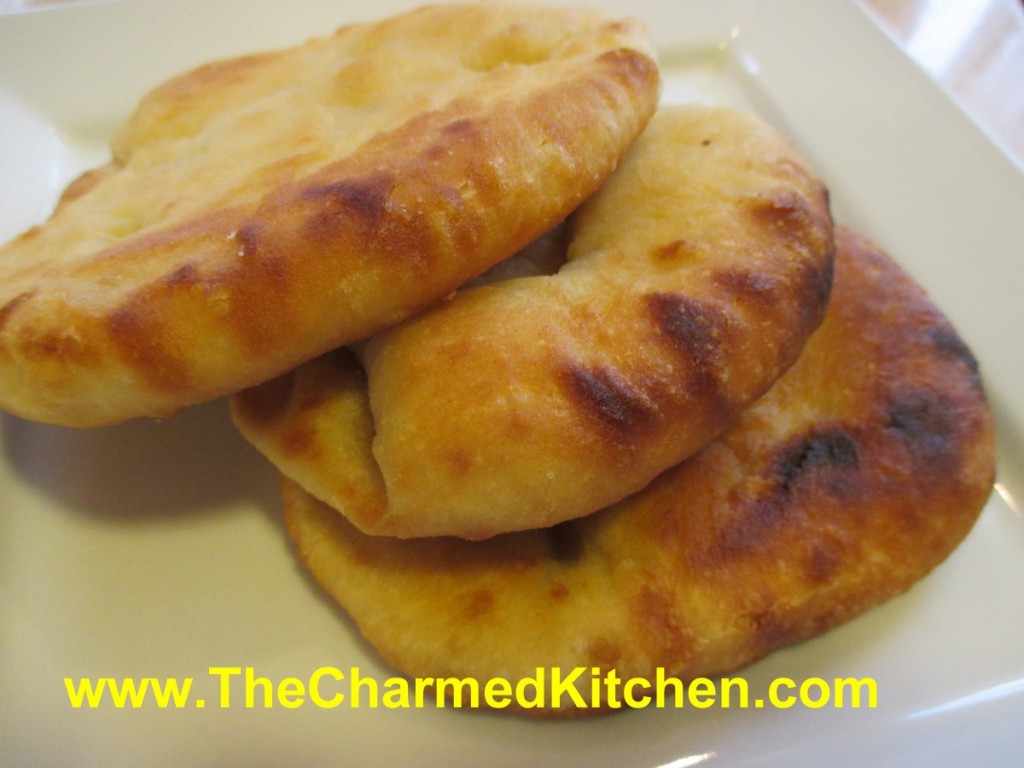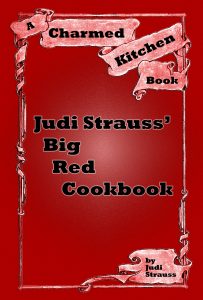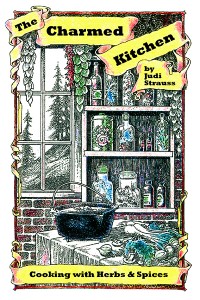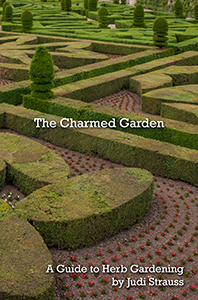Naan Bread

If you have ever eaten at an Indian restaurant, you probably had naan bread. The bread has a soft, yet chewy texture, and is often topped with seeds. I still remember the first time I made naan. I bake bread all the time, but somehow I had never made naan. I was excited to give it a try. I figured there would be some challenges.
The thin rounds of dough are traditionally baked against the wall of a tandoori oven. The clay of the oven walls gets really hot, and cooks the bread quickly. Since I don’t have a tandoori oven, I baked my naan bread under the broiler. I was nervous that it would get burnt before it finished baking, but they turned out great. Soft, puffy bread pillows that I brushed with ghee right after baking. They came out even better than I had hoped.
If you never made naan bread before, I suggest you try it. It is so much fun, and not that difficult. Just keep an eye on it when baking.
Naan Bread
1 t. sugar
1 pkt. Yeast
2/3 c. warm water
1½ c. flour
1 T. ghee*
1 t. salt
Oil for baking pans
Extra ghee for brushing breads
Sesame, fennel or poppy seeds, if you like
In medium bowl, combine sugar with yeast and warm water. Stir and allow to sit until mixture gets bubbly, about 10 minutes. In mixing bowl place the flour, ghee and salt and mix to combine. Add the yeast mixture and stir until a soft dough forms. You might have to add a little more water. Knead dough on a floured surface until smooth and elastic, about 5 minutes. Return dough to mixing bowl, cover and allow to rise in a warm place until doubled in size, about 1½ hours. Turn dough onto floured surface and knead a couple more minutes. Unless you have a tandoori oven, you will need to cook the naan under a very hot broiler. Turn the broiler on. Line a baking sheet with foil and coat with some oil. Set aside while you prepare the dough for baking. Cut dough into 6-8 pieces. Roll each piece into a circle about 5 inches across and ½ inch thick. Place dough on the prepared baking sheet and place under the broiler. I set mine about 4 inches from the heat. Turn breads a couple of times. They will take about 7 minutes to bake. Remove from broiler, brush with extra ghee or melted butter and sprinkle with seeds, if you like. Makes 6-8. Best served soon after baking.
*Ghee is essentially clarified butter, or butter where all the solids have been removed. To make ghee, gently melt butter in a saucepan over medium-low heat. After melting, the butter will separate into three layers. This should only take a few minutes. Foam will appear on the top layer, the milk solids will migrate to the bottom of the pan, and clarified butter will float between the two. Let the butter come to a simmer and hold it here until the middle layer becomes fragrant, more golden than when you started, and clear – push the solids on top out of the way to have a peek. The milk solids at the bottom will begin to brown. At this point it is a matter of preference, you can let the solids lightly brown, or let things progress a bit further. When the ghee is finished, skim absolutely all of the top layer of foam into a bowl with a spoon or strainer, turn off the heat, and allow things to settle for a minute or so. Next, carefully pour the golden central layer through a strainer, into a clean glass jar, leaving the milk solids at the bottom of the pan. It can be used as a cooking oil, for flavoring all sorts of foods, and is amazing on popcorn.
I posted the complete directions yesterday.
Naan Bread

If you have ever eaten at an Indian restaurant, you probably had naan bread. The bread has a soft, yet chewy texture, and is often topped with seeds. I still remember the first time I made naan. I bake bread all the time, but somehow I had never made naan. I was excited to give it a try. I figured there would be some challenges.
The thin rounds of dough are traditionally baked against the wall of a tandoori oven. The clay of the oven walls gets really hot, and cooks the bread quickly. Since I don’t have a tandoori oven, I baked my naan bread under the broiler. I was nervous that it would get burnt before it finished baking, but they turned out great. Soft, puffy bread pillows that I brushed with ghee right after baking. They came out even better than I had hoped.
If you never made naan bread before, I suggest you try it. It is so much fun, and not that difficult. Just keep an eye on it when baking.
Naan Bread
1 t. sugar
1 pkt. Yeast
2/3 c. warm water
1½ c. flour
1 T. ghee*
1 t. salt
Oil for baking pans
Extra ghee for brushing breads
Sesame, fennel or poppy seeds, if you like
In medium bowl, combine sugar with yeast and warm water. Stir and allow to sit until mixture gets bubbly, about 10 minutes. In mixing bowl place the flour, ghee and salt and mix to combine. Add the yeast mixture and stir until a soft dough forms. You might have to add a little more water. Knead dough on a floured surface until smooth and elastic, about 5 minutes. Return dough to mixing bowl, cover and allow to rise in a warm place until doubled in size, about 1½ hours. Turn dough onto floured surface and knead a couple more minutes. Unless you have a tandoori oven, you will need to cook the naan under a very hot broiler. Turn the broiler on. Line a baking sheet with foil and coat with some oil. Set aside while you prepare the dough for baking. Cut dough into 6-8 pieces. Roll each piece into a circle about 5 inches across and ½ inch thick. Place dough on the prepared baking sheet and place under the broiler. I set mine about 4 inches from the heat. Turn breads a couple of times. They will take about 7 minutes to bake. Remove from broiler, brush with extra ghee or melted butter and sprinkle with seeds, if you like. Makes 6-8. Best served soon after baking.
*Ghee is essentially clarified butter, or butter where all the solids have been removed. To make ghee, gently melt butter in a saucepan over medium-low heat. After melting, the butter will separate into three layers. This should only take a few minutes. Foam will appear on the top layer, the milk solids will migrate to the bottom of the pan, and clarified butter will float between the two. Let the butter come to a simmer and hold it here until the middle layer becomes fragrant, more golden than when you started, and clear – push the solids on top out of the way to have a peek. The milk solids at the bottom will begin to brown. At this point it is a matter of preference, you can let the solids lightly brown, or let things progress a bit further. When the ghee is finished, skim absolutely all of the top layer of foam into a bowl with a spoon or strainer, turn off the heat, and allow things to settle for a minute or so. Next, carefully pour the golden central layer through a strainer, into a clean glass jar, leaving the milk solids at the bottom of the pan. It can be used as a cooking oil, for flavoring all sorts of foods, and is amazing on popcorn.



